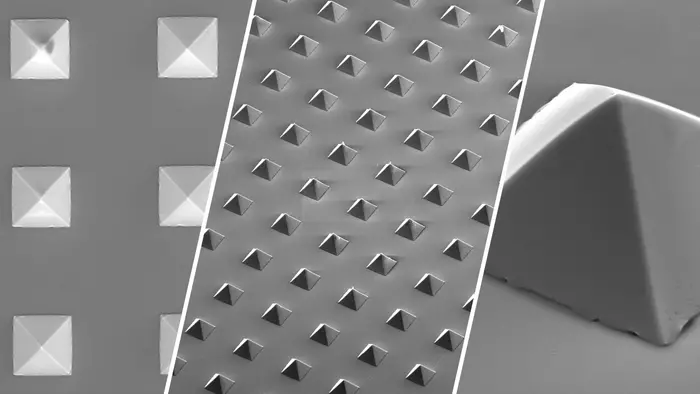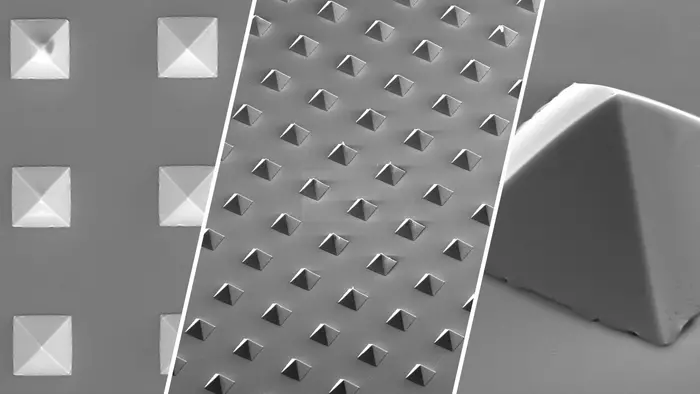NEW YORK, August 8, 2023 — CUNY ASRC researcher Adam Braunschweig’s lab is part of a newly awarded $20 million center from the U.S. National Science Foundation to understand the atomic-scale mysteries of “crushing” chemistry. The multi-institutional award will establish the Center for the Mechanical Control of Chemistry (CMCC), which will conduct work to understand how the mechanical application of force can enable new advances in chemistry and make industrial processes cheaper and more environmentally friendly.

Credit: Daniel Valles and Yerzhan Zholdassov/Advanced Science Research Center at the CUNY Graduate Center
NEW YORK, August 8, 2023 — CUNY ASRC researcher Adam Braunschweig’s lab is part of a newly awarded $20 million center from the U.S. National Science Foundation to understand the atomic-scale mysteries of “crushing” chemistry. The multi-institutional award will establish the Center for the Mechanical Control of Chemistry (CMCC), which will conduct work to understand how the mechanical application of force can enable new advances in chemistry and make industrial processes cheaper and more environmentally friendly.
“I’m excited that my lab is playing a part in research with the potential to transform the chemical manufacturing industry in a way that dramatically reduces the toxic waste that it generates,” said Braunschweig, who is a co-principal investigator on the NSF grant and a professor with the CUNY ASRC Nanoscience Initiative and Hunter College’s Chemistry and Biochemistry departments.
CMCC will be led by Texas A&M University with research and funding spread out over 10 institutions. Braunschweig’s lab will receive funding over the next five years to support a new post-doctoral researcher, two students and increased computational capacity. Additionally, the team will receive funding the build milling devices that carry out mechanochemical reactions.
Mechanical chemistry, or mechanochemistry, is the crushing of chemicals to produce reactions and substances. It has long been used by chemists and nature alike — for example, diamonds are created when carbon is squeezed under enormous pressure inside the Earth. While mechanical chemistry has been used to grind out everything from pigments in Renaissance-era paintings to medicinal compounds at your local pharmacy, the atomic-scale processes at the heart of such crushing transformations are not fully understood or predictable. Moreover, while heat or light are often used to impart the energy needed to make and break bonds in chemical reactions, the use of mechanical force to impart that energy and thus drive new types of chemistry remains an underexplored frontier.
“Using traditional chemical methods, chemists have discovered many effective ways to create substances that have enhanced human health and prosperity — like the ammonia essential for agricultural fertilizers, which help provide the world’s food supply. But such substances could potentially be produced in a more sustainable way through undiscovered techniques of mechanical chemistry,” says NSF Assistant Director for Mathematical and Physical Sciences Sean L. Jones. “NSF’s Center for the Mechanical Control of Chemistry will focus on providing the insights necessary for innovative minds across America to scale it up.”
The center itself is being scaled up. The $20 million from NSF is a phase two award from its Centers for Chemical Innovation program, which supports multiple centers aimed at solving fundamental challenges in chemical research and developing subsequent innovations. CMCC received a $2 million phase one award in 2020. The additional funding will enable the center to become a nexus for mechanical chemistry research across the U.S. by supporting work at 11 U.S. institutions in nine states.
The new funding will provide the center with instruments capable of investigating the effects of mechanical force at the atomic level, such as atomic force microscopes, electron microscopes, high-pressure diamond anvils and others. The center will help grow the scientific workforce through training and mentorship for early-career postdoctoral researchers, undergraduate and graduate students, and it will conduct educational outreach activities with local K-12 students and teachers.
For more information, visit NSF’s Centers for Chemical Innovation program.
About the Advanced Science Research Center at the CUNY Graduate Center
The Advanced Science Research Center at the CUNY Graduate Center (CUNY ASRC) is a world-leading center of scientific excellence that elevates STEM inquiry and education at CUNY and beyond. The CUNY ASRC’s research initiatives span five distinctive, but broadly interconnected disciplines: nanoscience, photonics, neuroscience, structural biology, and environmental sciences. The center promotes a collaborative, interdisciplinary research culture where renowned and emerging scientists advance their discoveries using state-of-the-art equipment and cutting-edge core facilities.





